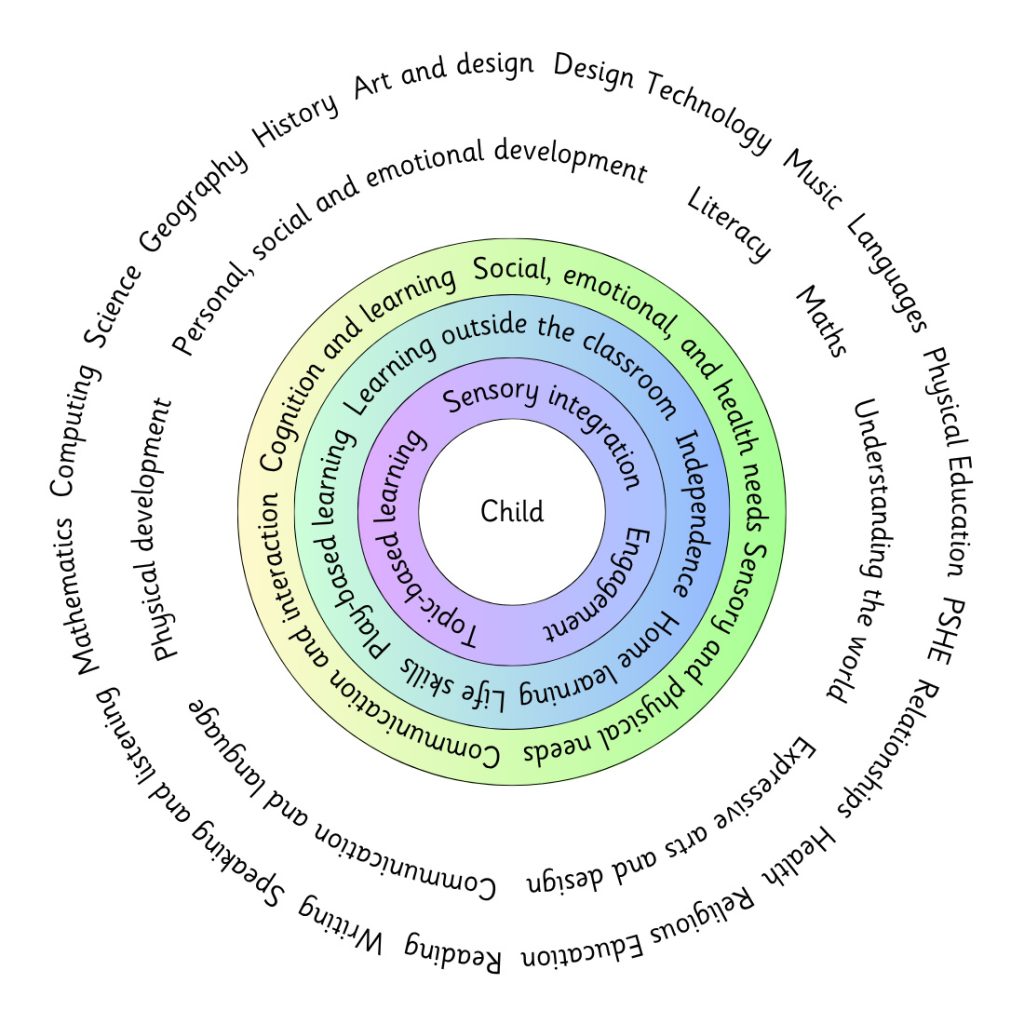The Vista Curriculum: Inclusive, Layered and Child-Centred
The Vista Curriculum is a fully inclusive and responsive model that centres each child within a curriculum designed to meet them where they are, not where age expectations say they should be.
It is grounded in the EYFS statutory framework and shaped by Birth to 5 Matters, but is used well beyond the early years to support children with additional needs who may continue to work within pre-Key Stage or early developmental levels throughout their primary journey.
A Non-Linear Journey Through Layers of Learning
Unlike traditional linear models, the Vista Curriculum is structured around concentric layers of development. These are not steps to be completed in order, but overlapping supportive systems that wrap around the child.
Inner Layer – Core Readiness
- Sensory Integration – enabling regulation and readiness.
- Engagement – supporting attention, interaction and motivation.
- Life Skills and Home Learning – developing independence and routines.
A child in Year 6 may still be working primarily in this layer because these needs must remain a priority to enable access, progress and wellbeing.
This inner circle reflects the principles of the Engagement Model, used for assessing pupils who are not engaged in subject-specific learning. By focusing on how a child responds, interacts and shows curiosity within their environment, the Vista Curriculum ensures that progress is understood through meaningful engagement, not narrow academic milestones.
Middle Layer – Flexible Learning Approaches
- Play-Based Learning – adapted for older learners through structured play, interaction and choice.
- Topic-Based Learning – motivating content linked to real-world themes matched to cognitive stage not chronological age.
Outer Layer – Inclusive Access to Curriculum Content
- Reflects the Four Areas of Need (SEND Code of Practice).
- Curriculum content is adapted to be meaningful, functional and accessible.
- Focus on communication, cognition, physical, social and emotional development – regardless of age.
Outcomes and Progress: Individual, Visible and Valued
The Vista Curriculum supports non-linear progress by recognising that:
- Progress is not always upward or outward – some children deepen learning within a single layer over time.
- Development may be cyclical or require consolidation, particularly in sensory and communication domains.
- Success looks different for every child: for some, remaining calm in a new environment is as meaningful as mastering phonics.
Children may:
- Continue to work towards EYFS outcomes well beyond Reception.
- Engage with aspects of pre-Key Stage standards across key stages.
- Make progress through semi-formal or informal learning pathways.
Pathways to the National Curriculum – When Ready
Where appropriate, Vista enables children to move dynamically between layers, including:
- Transitioning from sensory-based learning to more structured group sessions.
- Accessing National Curriculum content through adapted themes and approaches.
- Working towards formal outcomes via supported or scaffolded routes.
For some pupils, elements of the National Curriculum may remain aspirational, but every step toward participation, engagement and independence is valued, recorded and celebrated.
“In the Vista Curriculum, progress is not a path but a pattern – woven through sensory needs, communication, play and cognitive growth. For some children, the inner circle will always be home – and that is valid, visible and vital.”
